The gentle primrose is one of the first to decorate gardens in spring. More often, primroses are grown in open ground, planted in containers on balconies, there are indoor species. The multicolored colors of several varieties will create a real rainbow in the yard.
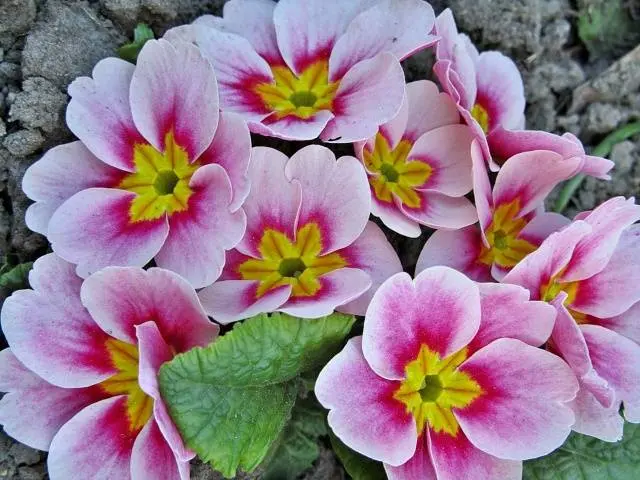
Description
Primroses belong to the Primrose family, their genus now includes 390 species that grow on all continents. There are varieties listed in the Red Book of the Federation. Plants bloom in early spring, apart from various bulbous flowers. Hence the Latin name for primroses: “primus” – “first”. Many peoples have their own touching legends about an elegant flower that announces the warm days that have come. Primrose clubs have existed in England for several centuries, and colorful exhibitions are held annually.
Despite the diversity of species, plants have common features. Wild primroses prefer wet areas: near streams, in meadows, where their rhizomes and roots are free. Oblong, oval, finely toothed leaves form a basal rosette. In some species, the peduncles are high, in others the flowers are low. Flowers of different shades of a tubular shape with a funnel-shaped or flat limb. Seeds ripen in a rounded or cylindrical achene.
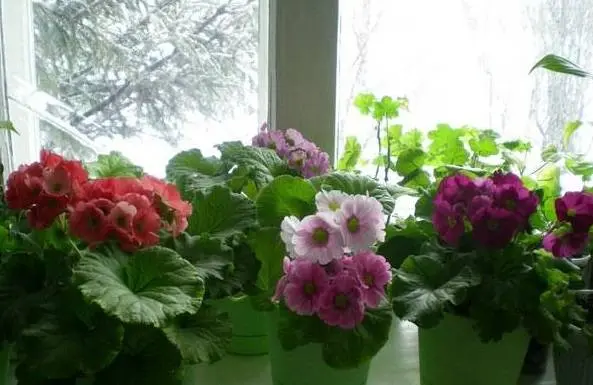
Species and varieties
In culture, several types of primroses are cultivated in the open field, there are many varieties. If the gardener is seriously interested in primroses, then even from different types of primroses, you can create a garden of constant flowering. There are varieties that begin the rainbow parade in mid-April, others come into bloom in May, June and even at the end of summer.
Spring primrose
In April, spring primrose or medicinal primrose blooms. The plant has many popular names based on visual perception: rams, golden or heavenly keys. The yellow primrose is associated with a legend about the keys that open the doors to summer. Others speak of the keys to paradise – where St. Peter dropped the keys, golden flowers grew there.
On wrinkled oval leaves, veins looming brightly. Leaf length up to 20 cm, width 6 cm, at the bottom of the plate slightly pubescent. Peduncle up to 30 cm carries an umbrella inflorescence – a “bunch” of yellow fragrant flowers resembling keys.
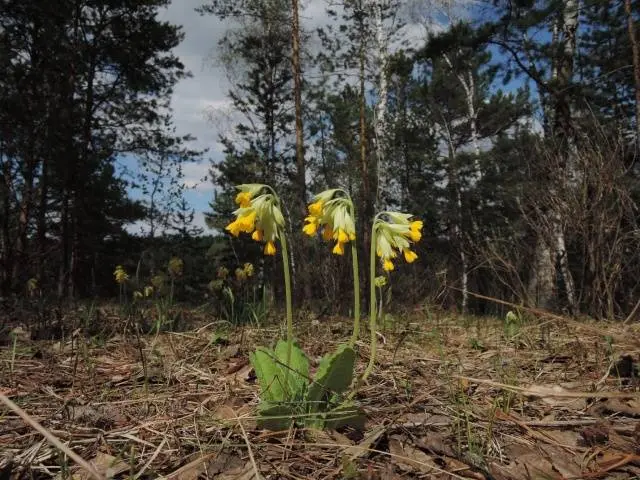
Primula vulgaris
The species is also called stemless primrose or akaulis. Large flowers of various colors on low peduncles create lovely bright cushions on rich green leaves. Plant height 10-12 cm, flower diameter up to 3-4 cm. Hybrid primroses have a rich palette of shades of simple or double flowers. Flowering is long – up to 40-50 days. Planting primrose bushes in open ground is possible when the threat of frost is gone. Interesting common varieties:
Virginia
Plant height up to 20 cm, flowers 3-4 cm, white, yellow center. Arranged one by one on the peduncle.
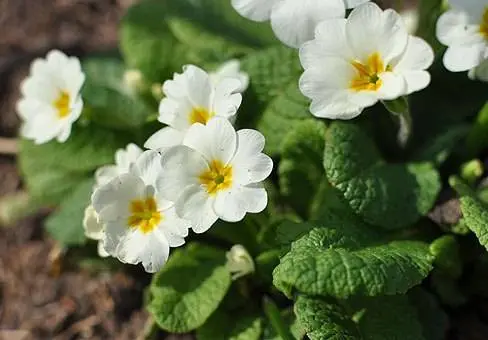
Cerulean
Flowers 2,5 cm, sky blue with a yellow center, collected in inflorescences of 10 pieces.
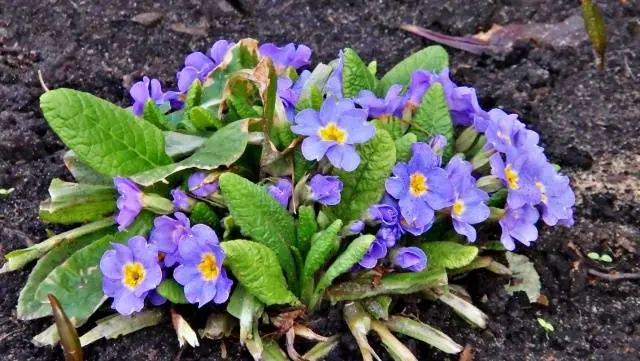
Atropurpura
The plant forms a dense inflorescence of dark red flowers with a yellow center. Flower diameter 2-3 cm.
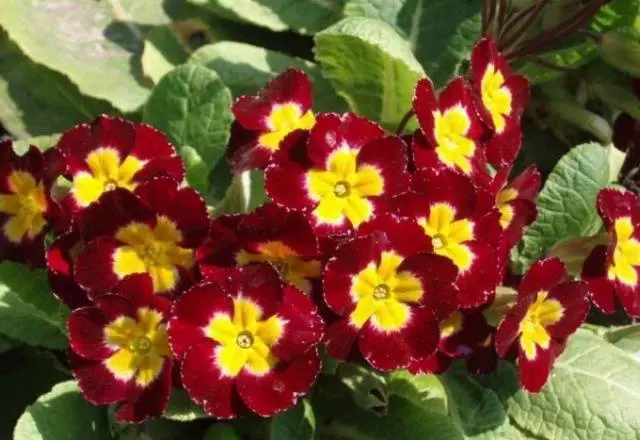
Primula high
Also an early-flowering species with rather high, up to 20 cm peduncles, on which several inflorescences are created. The range of colors is varied and very catchy, especially for the Gold Lace group. Terry varieties have been bred. Flowering in good conditions: planting in open ground not under the hot sun and with careful care, lasts up to 2 months, in April-May.
Alba
Umbrella bears 7-10 white flowers with a yellow center.
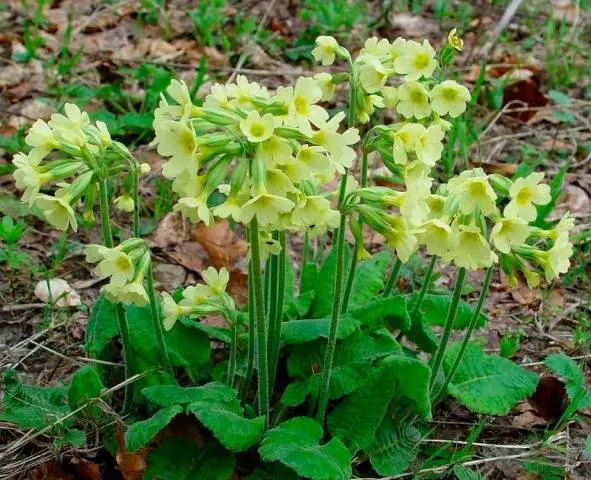
Gelle Farben
The flowers are light purple, up to 3,5 cm in diameter.
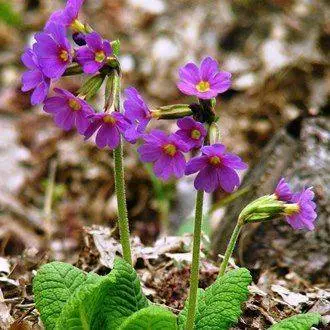
Gold Lace
Bright flowers with a light border and a yellow throat. The color of the petals is from bright pink to deep brown. Diameter 2,5-3,5 cm.
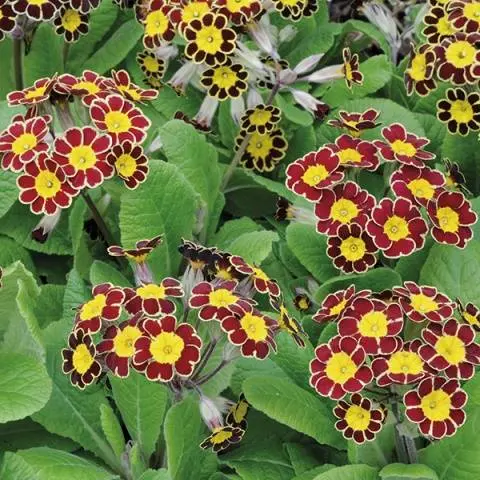
fine-toothed
In mid-May, a prominent primrose pleases the eye of gardeners, in which many flowers form on a high 40-60 cm peduncle. Multi-colored balls in the open field in a flower bed look amazing.
Ruby
Low-growing variety, up to 30 cm, large raspberry inflorescence – 6-8 cm.
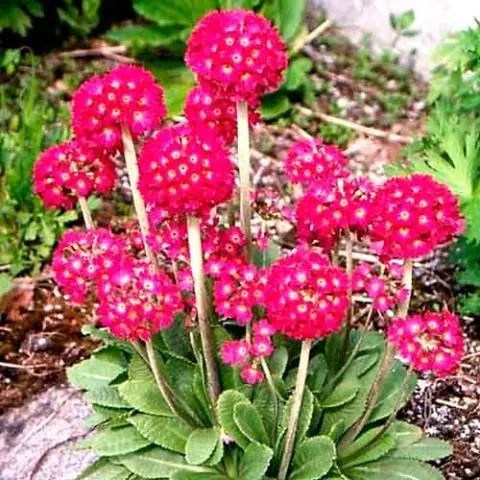
rubra
Bright purple 10 cm balls rise on 10-15 peduncles from the outlet.
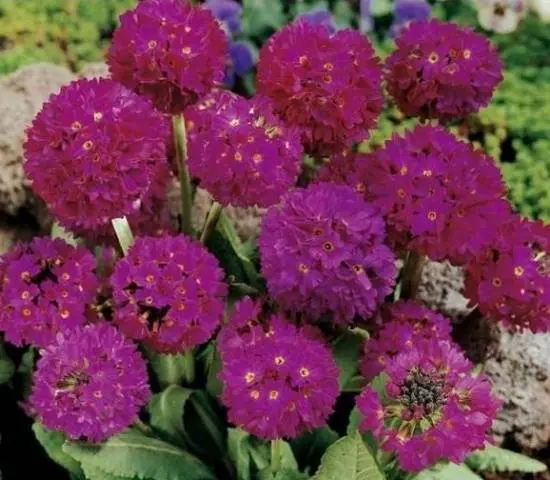
Alba
Small white flowers, no more than 1,5 cm, form a spectacular large inflorescence.
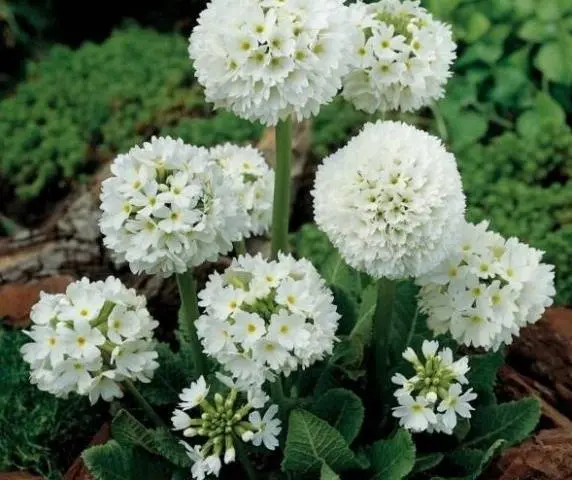
Primula Julia
Undersized bushes of this species also show off in May. When primroses are planted in open ground, this species can be moved first as the most frost-resistant. Raspberry-lilac flowers spread out in an impressive solid carpet. The plant looks beautiful on rock gardens.
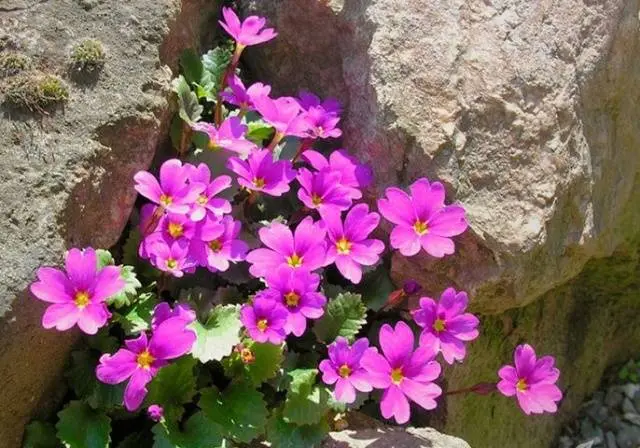
Primula Ushkovaya
These primroses bloom in May. Very popular in the UK, often called auricula (Latin – “ear”). Sometimes the plant is called “bear’s ear” because of the rounded, leathery leaves with pubescence. The leaf blade is green-blue with raised edges. The plant is low, up to 15-20 cm, in inflorescences 5-10 flowers. English breeders brought out a variety of hybrids of various colors. Interestingly, the seedlings do not repeat the color of the mother plant.
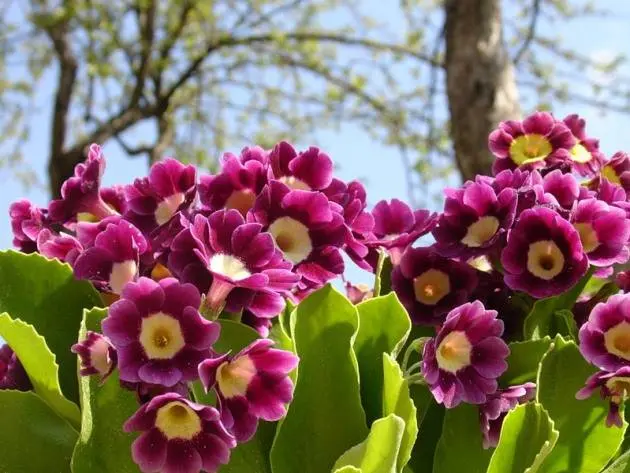
Siebold’s primrose
An undersized primrose blooms at the end of May. The plant has bright green leaves that dry out along with the flower stalks after flowering. Pink, white or lilac flowers are collected in loose inflorescences. The transformation of an ephemeroid flower must be taken into account when leaving and mark the landing site so as not to damage the dormant plant.
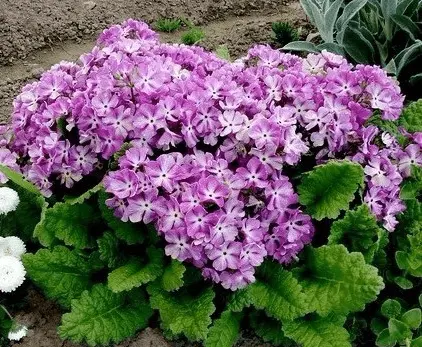
Candelabrum primrose
The view is magnificent, but not common, blooms in summer. The primrose has a tall, up to 50 cm, peduncle with purple, orange flowers placed in tiers.
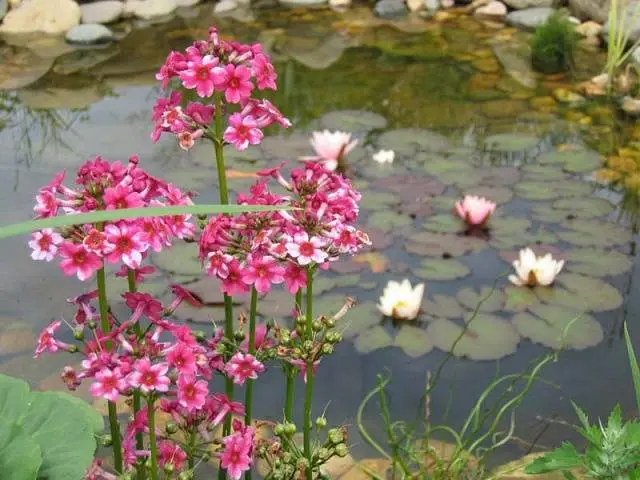
Florinda primrose
Blooms in late summer. It is also rare for us. Bright orange flowers in the form of delicate bells are raised on high, up to 80 cm, peduncles.
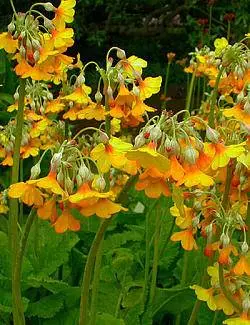
Reproduction
In the garden, primroses reproduce by self-sowing. In good conditions, they can crowd out some plants. But for this you need to first plant the bushes so that they take root. Gardeners sow graceful flowers with seeds through seedlings or directly into the ground in a flower bed. Flowers are also propagated by division of bushes and rooting of leaf petioles.
Seeds
Primroses are sown in spring, summer and before winter. Plants will flower in 2-3 years.
- In the spring, primrose is sown with seeds in open ground after the snow melts;
- Summer sowing is effective because the seeds are fresh and germinate quickly. It is only necessary to keep the soil moist for better seed germination;
- Having saved the seeds until autumn, primroses are sown so that they sprout in early spring.
Many flower growers buy seeds in late summer or autumn, as soon as they appear in the distribution network. Sown in containers, which are dug into the ground in the garden.
Seedlings
The most difficult stage in growing primrose is to wait for shoots. For sowing are accepted in February.
- The substrate is prepared from garden soil, sand and sod land in a ratio of 2: 1: 1;
- Seeds are laid out on the surface of the soil, slightly pressing into the soil;
- The container, wrapped in polyethylene, is placed in the freezer for a month to stratify the seeds;
- The thawed container in the bag is placed on the windowsill, where the temperature is kept at 16-18 degrees. The soil is moistened. Humidity should also be high. The package is slightly opened with the first sprouts, and then, after 10-15 days, they are removed;
- Seedling development is very slow. In the phase of the third leaf, the sprouts dive. Transplants are done several times as the flowers grow;
- Seedlings are transferred to open ground after two years, transplanting plants into a new ground every time they grow up;
- Some gardeners plant young seedlings in open ground immediately in the summer, at the stage of two leaves.
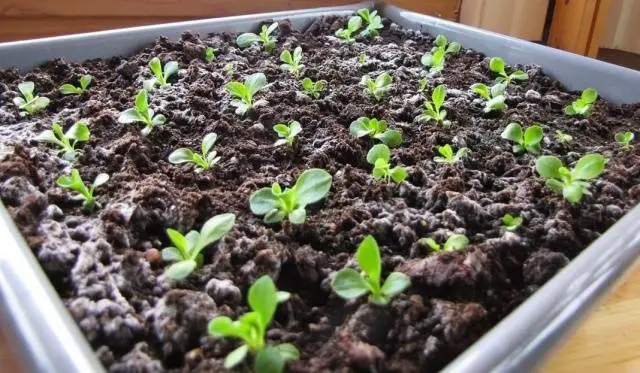
By division
It is better to transplant primrose bushes in August, early September or in spring, before flowering. Divide after 3-5 years of growth for rejuvenation and reproduction.
- The rhizomes are dug up, washed and cut into pieces with a sharp knife, making sure that they have buds;
- Slices should be sprinkled with wood ash and immediately plant rhizomes;
- Bushes are watered daily for 2 weeks;
- For the winter, transplanted flowers are covered with leaves and spruce branches.
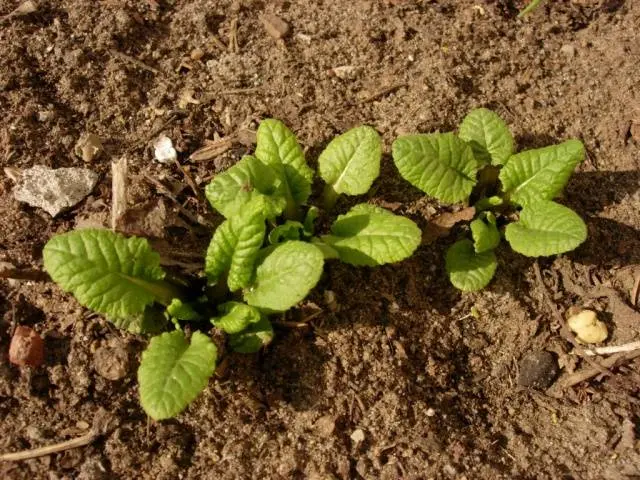
petioles
This method propagates young primroses. A leaf is selected, carefully cut off along with the kidney and placed in a pot with earth and sand. The leaf blade is also cut off by a third. The container is placed in a bright, but not sunny, cool place, up to 16-18 degrees. The soil is kept moist. After a while, shoots develop from the kidney.
Cultivation
Beautiful plants are sometimes capricious, like primroses. When they are planted in open ground, a suitable site is carefully chosen.
- For better survival, primroses are placed in light partial shade, under the crowns of trees, where the sun shines only in the morning;
- The site should be predominantly moist but well-drained;
- Planting a primrose and caring for a plant in the open field require attention from the grower. Plants prefer fertile loamy soil, are afraid of stagnant water;
- When preparing a place for primroses, the soil is enriched with humus, peat, leafy soil, a tablespoon of complex fertilizer is added per square meter;
- Primroses are not planted on those rock gardens that are located on the south side of the garden. Plants do not tolerate direct sunlight;
- Most varieties of primroses are winter-hardy. Plants are only covered with spruce branches. Hybrids for the winter are transplanted into pots.
Watering
Primroses love moist soil, without stagnant water.
- Plants are watered every week at 3 liters per 1 sq. m;
- Make sure that water does not get on the leaves;
- The soil is loosened, weeds are removed.
Feeding
Outdoor primrose care involves regular fertilization.
- In early spring, 1 sq. m contribute 15 g of nitrogen fertilizing;
- After two weeks, the soil under the primroses is fertilized with 15 g of superphosphate;
- In July or August, phosphorus-potassium fertilizers are given.
Beautiful flowers need care. But their flowering compensates for the time spent.









